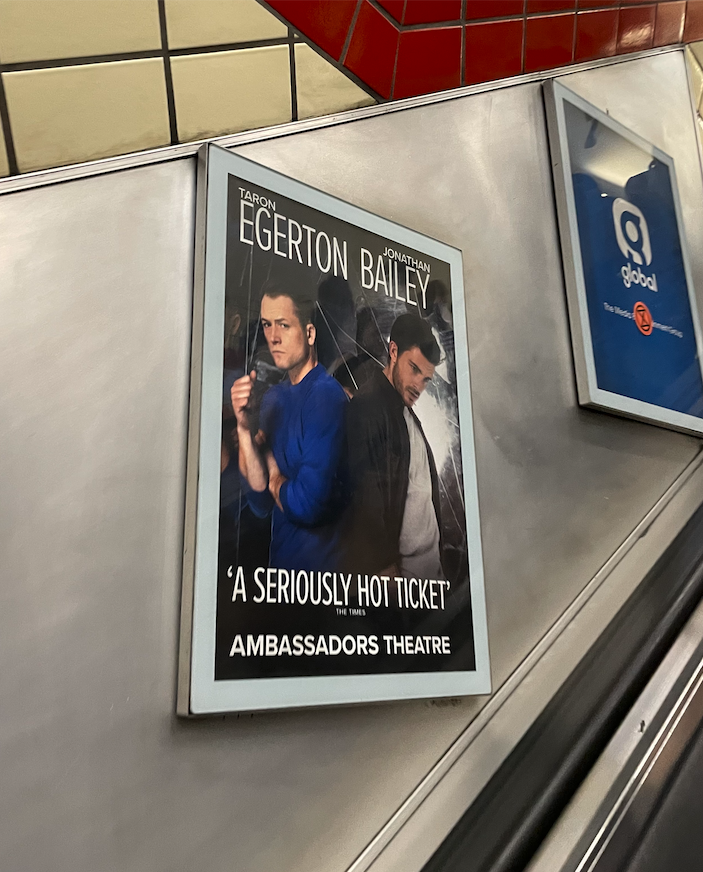‘Cock’: Title of West End Play Censored by London Underground, Producer ‘Absolutely Astounded’ by Rules (EXCLUSIVE)
- Oops!Something went wrong.Please try again later.

Patrons of London’s renowned subway system, the Underground, are used to seeing ubiquitous posters for the West End as they travel, but few can make heads or tails of an untitled poster featuring “Rocketman” star Taron Egerton and “Bridgerton’s” Jonathan Bailey.
The pair were starring together in West End play “Cock” but the show’s actual title has been censored in Tube advertisements by governing org Transport for London (TFL), Variety can reveal.
More from Variety
Apple Reveals Premiere Date for Taron Egerton Limited Series 'Black Bird' (TV News Roundup)
'Bridgerton' Season 2 Gets Off on Being Withholding: TV Review
'Cock' Review: Taron Egerton, Jonathan Bailey Lead a Blistering West End Production
Posters for the play (pictured) that have been widely advertised across TFL depict (a fully clothed) Bailey and Egerton — the latter actor withdrew from the play in early April citing personal reasons and was replaced by Joel Harper-Jackson — with their names boldly printed, along with the play’s venue and a snippet of a critic’s review that reads “A Seriously Hot Ticket!” However, there’s no other information indicating what exactly they’re starring in.

Manori Ravindran
A TFL spokesperson told Variety: “All advertising running on across the [TFL] estate needs to comply with both our own advertising policy and the Advertising Standards Authority’s codes and rulings. Following advice from the Committee of Advertising Practice, the campaign was amended to ensure it was compliant.”
The spokesperson did not provide any further reasoning as to why the title was removed. However, the decision has been slammed by “Cock” producer Chris Harper as outdated.
“We were absolutely astounded that we could not use the word ‘Cock’ on the underground – it is 2022!” said Harper in a statement shared with Variety. “The word is perfectly acceptable and has many meanings. Mike Bartlett’s hilarious play, which is currently playing at the Ambassadors Theatre where the title is proudly displayed on the theatre, is a beautifully written piece which was inspired by a cockfight.”
A closer look at the TFL’s advertising policy reveals that an advertisement will be unacceptable if “it is likely to cause widespread or serious offense to reasonable members of the public on account of the product or service being advertised, the content or design of the advertisement, or by way of implication,” and/or “it could reasonably be seen as distasteful, indecent or obscene, in its use of imagery, language or otherwise.”
Meanwhile, the Advertising Standards Authority’s “Harm and Offense” guidelines state that marketing mustn’t contain “anything that is likely to cause serious or widespread offense” and that compliance will be judged “on the context, medium, audience, product and prevailing standards.”
The Committee of Advertising Practice (CAP) is the self-regulatory body that creates, revises and enforces the Advertising Standards Authority Code. The poster industry members of CAP operate a poster pre-vetting sanction to deter abuse of the medium and states: “If the ASA rules against a poster on the grounds of serious or widespread offense or social irresponsibility, the poster advertiser becomes a candidate for mandatory pre-vetting.”
It appears that “Cock” was censored based on this pre-vetting, which resulted in an amendment that removed the play’s title completely.
Written by Mike Bartlett and produced by Elliot Harper, “Cock” centers on a gay protagonist, John (Bailey), who lives with his boyfriend, M (Egerton/Harper-Jackson). When he finds himself falling for a woman, W (Jade Anouka), he begins questioning his identity and society’s adherence to labels such as “gay,” “bi” and “straight.” In Variety’s review, critic David Benedict called the play an “engrossing, visceral ride through desire and self-deceit.”
Notably, Benedict also points out in his review that the play’s “considerable power lies in thrillingly clear suggestion, not literal display.” There are sex scenes, yes, but ones in which the actors don’t touch one another or remove “a stitch of clothing.”
Writes Benedict: “The deft dialogue and subtext and the imagination of the audience do an exhilarating amount of work.”
Yet even without explicitly sexual content, the play fell afoul of TFL standards.
This isn’t the first time the org has censored a West End play. In 2015, TFL banned a poster for the play “Bad Jews” on the basis that it could potentially “cause widespread or serious offense.” The play’s producer, Danny Moar, said at the time that the creative team, including him, was predominantly Jewish and that the word “bad” in the title was simply in reference to being non-observant.
Back in 2006, American comedian Reginald D. Hunter also fell on the wrong side of the TFL and advertising partner Viacom Outdoor, when his stand-up show, which included a variation of the N-word, was rejected for ads on the Underground.
In 2004, Underground posters for the Liam Neeson-fronted movie “Kinsey,” about the American sexologist, in which Neeson stands surrounded by sexual words, also had to be amended so that the word “orgasm” was replaced with “pleasure.”
Best of Variety
Molly Shannon's Memoir 'Hello Molly' Is Already an Instant Bestseller on Amazon
2022 Primetime Emmys Awards Season Calendar: The Governors Balls are Back After Two Years
Sign up for Variety’s Newsletter. For the latest news, follow us on Facebook, Twitter, and Instagram.

